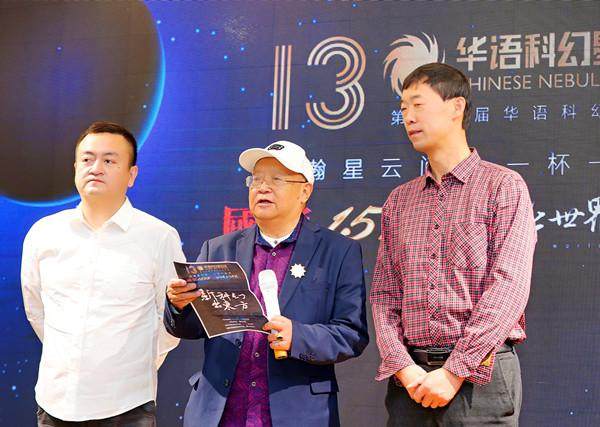
Chinese writer Liang Qingsan and the Japanese edition of "The Three-Body Problem" were among the top winners at the 13th Chinese Nebula Awards held Saturday in Chengdu.
Chinese writer Liang Qingsan has scooped the top award for his novel "The New New Newspaper Press: Shadow of the Enchanted Metropolis" at the 13th Chinese Nebula Awards held Saturday in Chengdu, Sichuan province, while the Japanese edition of "The Three-Body Problem" won the inaugural Star Bridge Award.
Liang's work is a steampunk novel set in China's late Qing Dynasty (1644–1911), exploring various characters in different sectors of society and the conflicts between technological development, national integrity and individual ethics, the jury panel announced.
Besides Liang's win for best novel, other major winners included Wanxiang Fengnian who took home the best novella prize for "The Eye of Saishiteng," and Liang Ling who won the best short story for "Lunar Bank." Meanwhile, the best translated work award went to "Star Maker" by William Olaf Stapledon, translated by Chinese sci-fi writer and translator Baoshu. In addition, Lu Ban won the best new writer award.
The Chinese Nebula Awards added several new categories this year. The first was the Star Bridge Award to recognize those who contributed to the international promotion of Chinese sci-fi literature. The inaugural award was handed to the team of Chinese and foreign publishers and translators — including Nozomi Omori and Yao Haijun — who helped promote the Hugo Award-winning sci-fi novel "The Three-Body Problem" by prestigious author Liu Cixin around the globe, particularly this time for their promotion of the Japanese edition.
"The Three-Body Problem," officially known as the "Remembrance of Earth's Past" trilogy, published its 16th anniversary Chinese edition this year. The work has now sold around 29 million copies worldwide in more than 30 languages, including 3.3 million copies of translated editions in overseas markets, according to the magazine and publisher Science Fiction World (SFW) and Chongqing Publishing Group. An animated series also debuted online on the streaming platform Bilibili on the same day that the 13th Chinese Nebula Awards was held.
Han Song, an iconic sci-fi writer and chairman of the organizing committee of the Chinese Nebula Awards, pointed out that Liu's "The Three-Body Problem" launched a new era for Chinese sci-fi, and many top contributors and companies helped its overseas publication and promotion. "We want to award those behind-the-scenes heroes," he said. "They really built a 'star bridge' between Chinese sci-fi and the world."
Another addition this year was the best science fiction game idea award, which was given to "Planet: Reboot" by MMC Society. The new award category aims to continue to deepen the exploration of the diverse development paths of the Chinese sci-fi industry, and encourage the development of films, animation, games and other works.
More than 200 famous sci-fi writers, publishers, academics and representatives from related industries, institutions and companies took part in the awards ceremony online or in person.
The Chinese Nebula Awards, an international award for science fiction writers in the Chinese language, are organized by Eternal Vision Science Fiction & Media Co. Hainan (EV/SFM), Time Vision, Chongqing Daily News Media Co. Ltd., and the Chongqing Science Writers Association. The awards were founded by Chinese sci-fi heavyweights Dong Renwei, Yao Haijun and Wu Yan in 2010.
The 13th Chinese Nebula Awards were originally to be held in Guanghan, Sichuan province, which is home to the world-renowned Sanxingdui Ruins — a Bronze Age site including the remains of an ancient city, sacrificial pits, residential quarters and tombs. The unique and otherworldly look of the relics discovered there has ignited the imaginations of many sci-fi writers. However, COVID-19 outbreaks delayed the awards several times, and led the organizers to finally change location, while several heavyweights including Liu Cixin and several winners were absent and had to take part via video link.
Dong Renwei, sci-fi mogul and one of the founders of the awards, expressed his regret about the small scale of this year's event but assured everyone that the 14th Chinese Nebula Awards will compensate and go to Sanxingdui as previously planned after China loosens restrictions. "When I founded the awards, I wanted it to be a big event, gathering and carnival for Chinese sci-fi people around the world," he said. "Next year we will achieve that again."